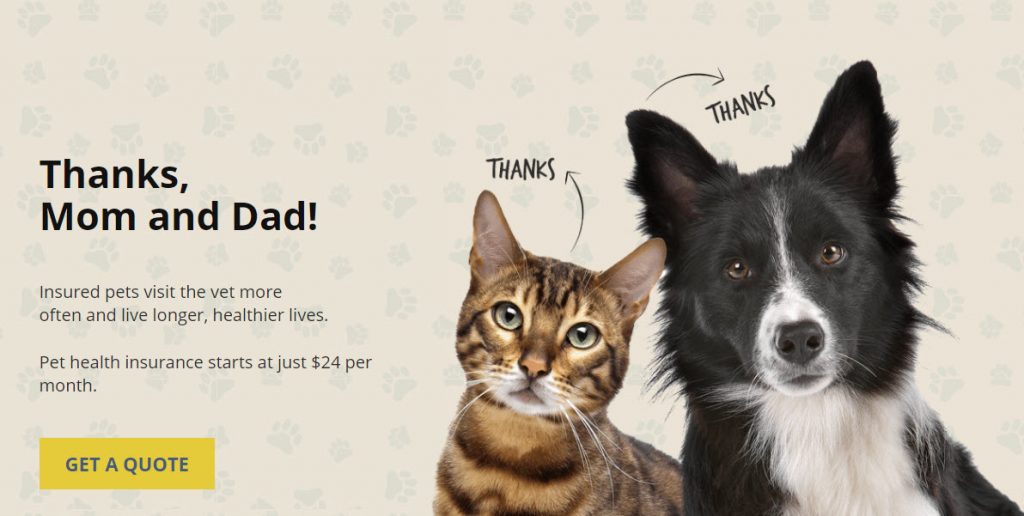Acral Lick Granuloma in Dogs
Free Pet Insurance Comparison
Compare Quotes From Top Companies and Save
Secured with SHA-256 Encryption
Dr. Pippa Elliott BVMS, MRCVS
Veterinarian
Dr Pippa Elliott BVMS, MRCVS is a veterinarian with over 30 years of experience in companion animal practice. In 1987 she graduated from the University of Glasgow, with a degree in veterinary medicine and surgery. She works at Blythwood Vets and the People’s Dispensary for Sick Animals (PDSA). Pippa is an advocate of Fear-Free Practice, an animal addict, and a veterinary writer. She is also w...
Veterinarian
UPDATED: Dec 16, 2023
Pet Insurance U receives compensation from the third parties included on this site. This includes payment for clicks from our site to insurance providers’ sites and quote requests generated. Our rankings and reviews are not affected by payments from the insurance companies. The compensation we receive allows the site to be free and regularly updated. Our goal is to review every pet insurance provider, but not all companies are listed on the site.
And many of the companies we review do not pay us anything. We simply rate, compare and review their plan because we feel it will be valuable to you. Our reviews are guaranteed to be unbiased, professional and advertising compensation does not influence rankings.
We are a free online resource for anyone interested in learning more about pet insurance. Our goal is to be an objective, third-party resource for everything pet insurance related. We update our site regularly, and all content is reviewed by pet insurance experts.
UPDATED: Dec 16, 2023
Pet Insurance U receives compensation from the third parties included on this site. This includes payment for clicks from our site to insurance providers’ sites and quote requests generated. Our rankings and reviews are not affected by payments from the insurance companies. The compensation we receive allows the site to be free and regularly updated. Our goal is to review every pet insurance provider, but not all companies are listed on the site.
And many of the companies we review do not pay us anything. We simply rate, compare and review their plan because we feel it will be valuable to you. Our reviews are guaranteed to be unbiased, professional and advertising compensation does not influence rankings.
On This Page
Acral Lick Granuloma Treatment Cost: $50 to $1,500
Table of Contents:
What is Acral Lick Granuloma in Dogs?
Acral lick granulomas, or lick granulomas, are also known as acral lick dermatitis. They are one of the most frustrating conditions for veterinarians and pet parents.
A lick granuloma is a chronic and infected skin lesion.
They usually start as a small, harmless spot. But the spot isn’t the problem. A granuloma forms when the dog obsessively licks and chews the tiny spot. The result is a big, oozing wound.
Granulomas affect the deepest layers of the skin. The dog’s compulsive licking forces bacteria far down, even to the base layer. Most granulomas have broken hair follicles, scarred oil glands, and wounded blood capillaries.
Acral lick dermatitis most often occurs on the front lower legs and paws because these areas are easily accessible by the dog’s mouth.
Enter your ZIP code below to view companies that have cheap pet insurance rates.
Secured with SHA-256 Encryption
Causes of Acral Lick Granuloma
It might seem like a bothersome bump causes that kind of licking that eventually forms a granuloma. However, there are many things that cause a dog to lick themselves:
Dog Anxiety and Stress
Many granulomas occur because of dog anxiety. Dogs “self-stimulate” to cope with feelings of anxiety. One method of self-stimulation is repetitive licking.
For a dog with moderate to severe anxiety, the licking becomes compulsive. Unfortunately, by trying to self-soothe, a dog inflicts painful wounds.
Stress in dogs can be caused by a new child or pet in the home, separation anxiety, or unfamiliar surroundings. There are many other sources of stress for dogs.
Boredom in Dogs
Some veterinarians believe that boredom can lead to lick granulomas. With nothing else to do, dogs lick themselves excessively to pass the time.
Canine Allergies
Allergies can cause skin inflammation and itching. Dogs will lick to manage the discomfort. Even mild allergies can cause itchiness. Dogs can be allergic to food and environmental allergens, such as pollen.
Foreign Bodies
A bee sting, splinter, or thistle spine can be painful if not removed. Dogs will groom a painful area in order to get rid of whatever is bothering them. Grooming may become excessive if the foreign body can’t be easily removed.
Hypothyroidism in Dogs
Some cases of acral lick granuloma are due to hypothyroidism in dogs. This is more commonly seen in black Labs than any other breed.
Dog Breeds Prone to Lick Granuloma
Any dog can suffer from excessive licking, but certain breeds are more prone to acral lick granulomas. These breeds are:
Treating Acral Lick Granuloma
The obvious treatment for lick granulomas is to stop the licking. But it’s not that simple. It’s very hard to get a dog to stop licking themselves, especially when they’re left alone.
Lick granuloma treatment is complicated and frustrating. The wound may begin to heal, but the dog will begin licking again and all progress is lost.
Stop Dog from Licking a Granuloma
Pet parents and veterinarians may apply a bandage or cast-like material to the granuloma to protect it. Most often, the dog will begin licking the other leg and cause a second granuloma.
Other recommended treatments are to apply a foul-tasting topical to the area or to make the dog wear a medical collar. These are temporary solutions that don’t provide a long term fix. The dog will resume chewing at the granuloma once the collar is removed or the topical becomes tolerable.
Acral Lick Granuloma Laser Surgery
Recently, laser surgery has become an effective treatment for lick granulomas. Veterinary surgeons carefully laser the granuloma to remove the diseased surface layers.
At the same time, nerves are sealed off so the dog doesn’t experience ongoing pain or discomfort. This reduces the desire to lick (if the granuloma isn’t due to psychological causes).
Not all veterinarians have laser instruments. Ask your vet for a referral if you are interested in laser treatment for your dog’s lick granuloma.
Anxiety Medications for Lick Granulomas
Unfortunately, laser surgery may not be very helpful in the long run for dogs with a psychological compulsion to lick and chew. Lasers can’t prevent a dog from causing another granuloma.
In anxious dogs, anti-anxiety medications may reduce self-soothing behaviors. This can lead to less lick dermatitis, but it is usually not a complete solution.
There over the counter products for dog anxiety. Many pet parents trust these products to help calm their dog.
Need Pet Insurance?
FACT: Pet insurance pays up to 90% of vet bills when your pet is sick or injured!
Lick Granuloma Cortisone Injections
Cortisone injections can provide rapid relief for lick granuloma symptoms. Cortisone reduces swelling and itchiness.
However, the calming effect only lasts as long as the wound is left alone. Once the dog begins licking the area, the granuloma is activated again
Antibiotics for Acral Lick Granulomas
Long term antibiotics may be the best treatment for acral lick granulomas.
Most dogs with chronic granulomas have success with 3 to 6 months of antibiotic medications, in conjunction with topical treatment.
Related: 10 Things You Must Know Before You Buy Pet Insurance
Enter your ZIP code below to view companies that have cheap pet insurance rates.
Secured with SHA-256 Encryption
Preventing Acral Lick Granulomas
There is no cure for lick granulomas, but pet parents can take steps to prevent them from recurring.
Paying close attention to areas that seem bothersome and treating them quickly can prevent incessant licking.
Dog Food and Lick Granulomas
There is no doubt that diet plays an important role in granuloma formation (as well as other dog skin issues). A wholesome diet is necessary for healthy skin and coat.
If your dog is suffering from chronic granulomas, consider switching to a whole-foods based or a raw-food diet.
Dog food allergies are to proteins only, so experiment with switching proteins. For example, feed turkey instead of chicken.
Real Cost Savings from PetFirst Clients

Luna
PetFirst saved his parents
$6,712
A happy energetic Luna one morning couldn’t hold her food down. After months of multiple costly vet visits to specialists and an endoscopy, the problem was discovered and fixed. Luna put 22 pounds back on in no time and her parents were grateful for having PetFirst by their side to pay the bills.
Lick Dermatitis and Nutritional Supplements for Dogs
Also, adding nutritional supplements can make a huge difference in your dog’s skin.
Omega-3 fatty acids strengthen the skin’s protective barrier. Probiotics address digestive issues that lead to skin conditions.
Pet Insurance and Acral Lick Granulomas
Many pet insurances cover prescription medications, nutritional supplements, and veterinary treatment for acral lick granulomas.
If your dog needs surgery for acral lick dermatitis, pet insurance can reimburse you for up to 90% of the surgery cost.
Additionally, some dog insurances offer wellness plans for preventative care.
We recommend comparing pet insurances to find a plan that offers the best coverage for your dog while fitting your budget.
We also recommend insuring a puppy before they develop acral lick granulomas or other medical issues.
Be aware of pet insurance pre-existing conditions.
If your dog is diagnosed with lick granuloma before you invest in pet insurance, treatment may not be covered.
Return to the Dog Health Problems glossary.
Other articles you may find helpful:
Is Exotic Pet Insurance Necessary?
The Best Pet Insurance By State
Fun Facts, Dog FAQ, And Unsolicited Dog Advice
5 Training Commands to Save Your Dog’s Life
The Ultimate Guide to Safe Foods for Dogs
We get it, your dog is like your child and when your puppy or dog has health problems it is scary. Luckily there is pet insurance companies that will help you pay for any veterinarian care they made need. Checkout the best puppy and dog pet insurance companies and learn about common puppy health issues and ailments in older pets.
Common Health Problems:
Chronic Active Hepatitis in Dogs
Cruciate Ligament Tear in Dogs
Degenerative Myelopathy | Spinal Cord Disease In Dogs
Dementia in Dogs | Canine Cognitive Dysfunction
Dog Comedones (Schnauzer Bumps)
Dog Diarrhea: What Can You Do To Help?
Gallbladder Obstruction in Dogs
Heart Murmurs In Dogs | How To Identify Them
Intervertebral Disc Disease In Dogs
Nasal Solar Dermatitis In Dogs
Progressive Retinal Atrophy In Dogs
The Dog Flu – Symptoms & Treatment for Canine Influenza


Frequently Asked Questions
Is the insurance information on this page secure?
Yes, the information on this page is secured with SHA-256 encryption, ensuring a high level of security for users.
What is the purpose of the Advertiser Disclosure section?
The Advertiser Disclosure section indicates that Pet Insurance U receives compensation from third parties included on the site. This compensation covers clicks to insurance providers’ sites and generated quote requests. It does not impact the site’s rankings and reviews, ensuring unbiased and professional content.
Does compensation from insurance companies affect the site’s reviews and rankings?
No, the compensation received does not influence rankings or reviews. The goal is to provide unbiased and professional reviews, and the compensation received allows the site to remain free and regularly updated.
Why are not all pet insurance providers listed on the site?
While the goal is to review every pet insurance provider, not all companies are listed. Some companies may not pay for reviews, but the reviews are still conducted to provide valuable information to users.
Are the reviews and rankings influenced by advertising compensation?
No, the reviews are guaranteed to be unbiased, professional, and advertising compensation does not impact the rankings.
Is the information regularly updated on the site?
Yes, the site is regularly updated, and all content is reviewed by pet insurance experts to ensure accuracy and relevance.
What is Acral Lick Granuloma in Dogs?
Acral Lick Granuloma, also known as acral lick dermatitis, is a chronic and infected skin lesion in dogs. It results from obsessive licking and chewing of a small spot, leading to a large, oozing wound affecting the deeper layers of the skin.
What are the common causes of Acral Lick Granuloma?
Common causes include dog anxiety and stress, boredom, canine allergies, foreign bodies, and hypothyroidism. Certain dog breeds are more prone to acral lick granulomas.
How is Acral Lick Granuloma treated in dogs?
Treatment is challenging and may involve measures to stop the dog from licking, such as bandages, foul-tasting topicals, or medical collars. Laser surgery, anxiety medications, cortisone injections, and antibiotics are also potential treatments.
Can pet insurance cover the costs associated with Acral Lick Granuloma treatmeHow can Acral Lick Granulomas be prevented?
nt?
Many pet insurances cover prescription medications, nutritional supplements, and veterinary treatment for acral lick granulomas. Surgery costs may also be reimbursed up to 90% by some pet insurance plans.
How can Acral Lick Granulomas be prevented?
While there is no cure, pet parents can prevent recurrence by promptly treating bothersome areas, providing a wholesome diet, adding nutritional supplements, and considering preventive care through pet insurance.
Enter your ZIP code below to view companies that have cheap pet insurance rates.
Secured with SHA-256 Encryption
Dr. Pippa Elliott BVMS, MRCVS
Veterinarian
Dr Pippa Elliott BVMS, MRCVS is a veterinarian with over 30 years of experience in companion animal practice. In 1987 she graduated from the University of Glasgow, with a degree in veterinary medicine and surgery. She works at Blythwood Vets and the People’s Dispensary for Sick Animals (PDSA). Pippa is an advocate of Fear-Free Practice, an animal addict, and a veterinary writer. She is also w...
Veterinarian
We are a free online resource for anyone interested in learning more about pet insurance. Our goal is to be an objective, third-party resource for everything pet insurance related. We update our site regularly, and all content is reviewed by pet insurance experts.


